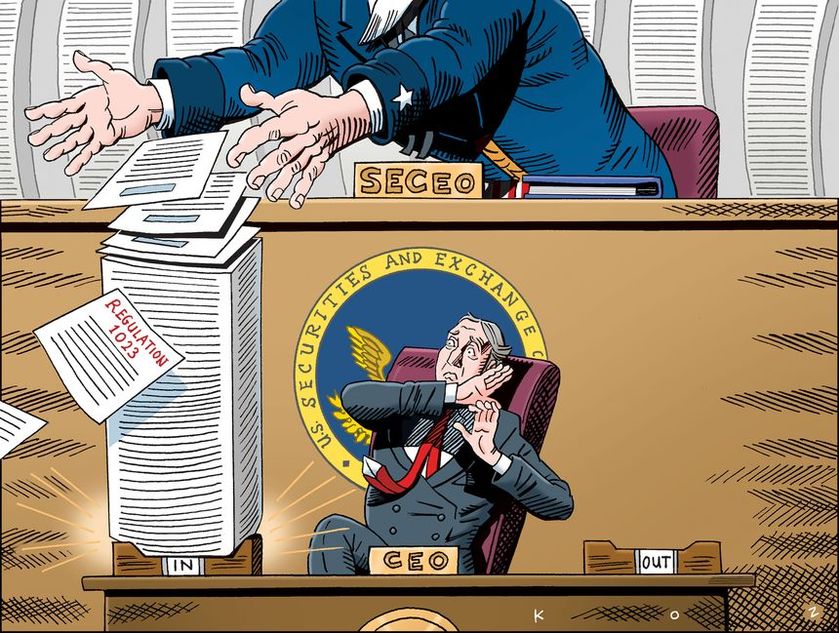Now, with the economy expected to slip into recession, the coming regulatory tsunami far exceeds the excesses of the post-financial-crisis period. Nowhere are the current regulatory excesses more evident than at the Securities and Exchange Commission.
The SEC’s mandate is vital but limited. Securities laws empower the commission to combat market abuses and fraud and to ensure that investors have material information to make their own investment judgments. As President Franklin D. Roosevelt explained when signing the Securities Act of 1933, “It is, of course, no insurance against errors of judgment. That is the function of no Government. It does give assurance, however, that, within the limit of its powers, the Federal Government will insist upon knowledge of the facts on which alone judgment can be based.”
But the SEC now proposes to substitute its own judgment for that of investors, corporate directors and managers. Its recent set of proposed rules, many of which go beyond any statutory remit, have little to do with preventing abuse or fostering transparency. The SEC has taken on the role of telling companies how to run themselves and investors how to invest. In the process, the SEC is eviscerating the vital barrier in our market-driven economy between the limited and legally constrained responsibilities of the public sector and the primacy of the private sector as the driver of American prosperity.
Consider the commission’s climate-change proposal, which seeks to force climate risk to the center of every public company’s boardroom and management discussions. It would push companies to populate their boards and management ranks with climate experts and focus their strategic business and financial plans away from increasing market share and profitability to plans to transition to a lower-carbon economy.
Although technically applicable only to public companies, the proposal would reach every customer and supplier in a public company’s “value chain.” Large public companies would have to collect and report their suppliers’ and customers’ greenhouse-gas emissions, forcing countless small businesses and farmers to undertake expensive guessing exercises about how much of seven different gases they might be emitting.

The SEC, in a tacit acknowledgment of the proposed rule’s compliance burdens, moonlights in the proposal as a management consultant. It suggests that one way to reduce the data collection burden is to work with “suppliers and downstream distributors to take steps to reduce those entities’ . . . emissions.” The SEC also suggests that public companies make “products that are more energy efficient or involve less emissions when consumers use them,” choose “distributors that use shorter transportation routes,” or “purchase from more emission-efficient suppliers.”
The SEC proposes to turn a disclosure rule into a how-to guide for companies seeking to reduce their carbon footprints. Inducing private companies to take specific steps to meet unlegislated social goals has nothing to do with achieving the SEC’s mission of combating fraud, increasing transparency or fostering market integrity. It would undermine the market efficiency that the SEC’s rules are supposed to support.
The commission also proposes to disrupt the mutual-funds market. Long a staple of retail investors’ portfolios, mutual funds are a cheap and effective way to gain diversified, liquid exposure to the markets. A recent SEC proposal would fundamentally change mutual funds.
The market already offers exchange-traded funds for investors who are concerned that their funds will be diluted when other shareholders sell, but the SEC insists that mutual funds be redesigned to address this concern. Although presented as an investor-protection measure, the proposal could harm retail investors. Funds would be forced to use a complicated pricing formula and to impose a surcharge on investors trying to buy and sell fund shares, which would require a costly redesign of the entire mutual-fund distribution system. The SEC itself acknowledges the proposal would increase mutual-fund investors’ costs, decrease their convenience, and even drive investors out of mutual funds altogether. The commission seems willing to jeopardize one of our most successful investment products based solely on the premise that it understands markets better than market participants do.

A well-functioning equity market is fundamental to a healthy economy. Here, too, the SEC proposes to fix what appears not to be broken. Retail investors are able to buy and sell stocks more easily than ever before, at competitive prices, often without paying a commission. Rather than simply work to enhance existing disclosures, the SEC has decided to remake the markets by forcing retail orders into auctions of its own design. Allowing the market to experiment with auctions would be fine, but the SEC wants to force all retail investors into those auctions. In so doing, the SEC proposes to replace the judgment of retail brokers about how to best serve their customers with its own one-size-fits-all model for executing stock trades.
The SEC not only has expanded its regulatory reach far beyond its legal authority; it has morphed from an umpire objectively enforcing the rule of law to an economic policy maker dictating how the economy will operate. The SEC’s rule proposals would change the way companies are managed and the way investors invest. Government prescriptions, not private preferences, would decide how Americans’ hard-earned money is put to work. Reflecting a conceit that its judgment is superior to the collective wisdom of the market, the SEC proposes to expand the role of government and reduce the economic freedom that has been the source of American economic exceptionalism.
** Mr. Gramm is a former chairman of the Senate Banking Committee and a nonresident senior fellow at American Enterprise Institute. Ms. Peirce is an SEC commissioner.











 All while Pfizer—a company with a $2.3 billion criminal fine for fraudulent marketing, bribery, and kickbacks—was given blanket immunity from liability and billions in taxpayer dollars to produce a vaccine in record time with no long-term safety data.
All while Pfizer—a company with a $2.3 billion criminal fine for fraudulent marketing, bribery, and kickbacks—was given blanket immunity from liability and billions in taxpayer dollars to produce a vaccine in record time with no long-term safety data.
























